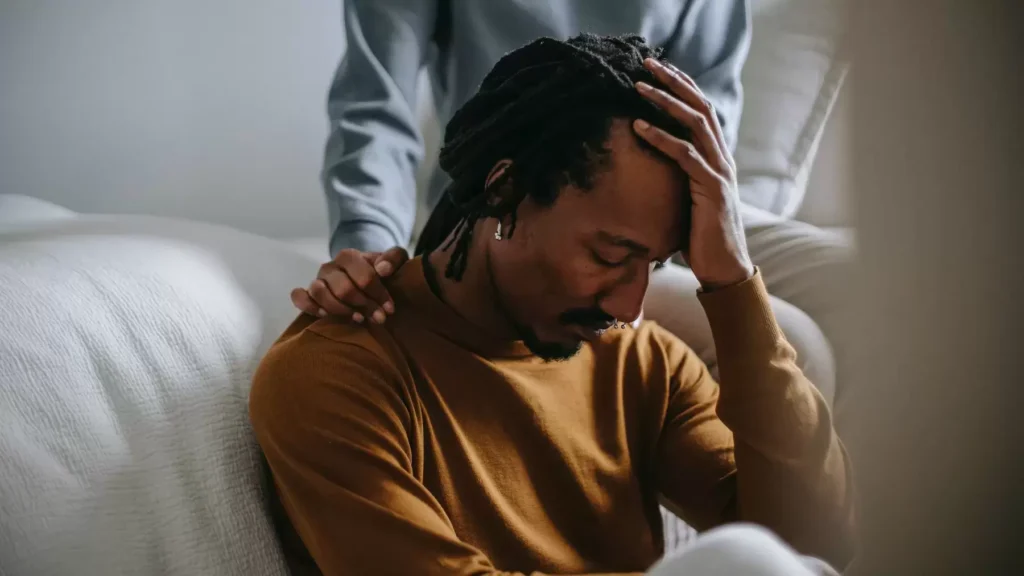If you asked 10 strangers the first thing they thought of when they heard the word “recovery,” you’d probably get 10 different answers. When it comes to mental health conditions and addiction, everyone has their own definition of recovery. While definitions may vary, most people would probably agree recovery is anything but easy.
Four mental health professionals with lived experience tackled the topic of recovery in a recent MHA webinar. They spoke about the challenges, how to find healthy social support, and what has been most helpful to them in their own recovery journeys.
Whether you’re just starting recovery, have been struggling with it for a while, or are curious how you can support a loved one with theirs, here are four things to remember when recovery gets hard.
1. “Trust that things will be okay.”
Luis Cornejo, licensed marriage and family therapist, founder of PsychoSocial Media, and cofounder of and service provider at PsychoSocial Therapy, which specializes in LGBTQ+ and BIPOC mental health
Growing up in a community that didn’t talk about mental health, Cornejo encouraged those struggling in recovery to remember that time is not stagnant. There’s hope because time provides an opportunity for change, and it never stops moving.
Many with lived experience have a love/hate relationship with hearing “things are going to be OK” when struggling It’s difficult to believe life could be better when depression and suicidal thoughts, for example, linger for years or worsen. But, finding the right mix of support makes it possible to find hope, even if you don’t believe that right now.
2. “If you don’t connect with a certain therapist, it’s OK to try another.”
Keegan Wick, national advocacy and outreach manager at Faces & Voices of Recovery
Unfortunately, terrible experiences with therapy happen, and some swear it off, convinced it won’t help. All the panelists agreed you have to find what works for you.
Not every treatment, provider, or modality will be the right fit, and that’s okay. It can feel defeating to use what little energy you have on something that doesn’t end up helping, but it’s worth finding what works. The right person or treatment will make recovery a smoother process in the long run.
3. “There is a gift in recovery.”
Lisa Radzak, executive director of WithAll, a nonprofit preventing and supporting those recovering from eating disorders
If you read that and rolled your eyes, that’s okay – many in recovery would do the same. Radzak talked about how recovery comes when you reach a point where you have no choice but to be honest. She described recovery as a gift because there’s a sort of rebirth when faced with having to build your own path forward, which some never experience.
You may not see progress for a long time, despite being “in recovery.” But even through setbacks, you are still learning, growing, and gaining skills – all of which are invaluable to becoming mentally healthy.
4. “As an adult, I get to protect me, I get to show up for me.”
Lori Poland, licensed professional counselor, CEO and co-founder of the National Foundation to End Child Abuse and Neglect
As a survivor of childhood trauma, Poland talked about the freedom she found as an adult in recovery. She gets to be the person for herself that she didn’t have as a child.
Despite trauma or unhealthy behaviors, anything learned can be unlearned. Poland said she had to teach her body not to expect trauma and challenges repeatedly. Everyon can rewrite their stories and learn to live from a place of freedom instead of imprisonment.
At the end of the day, while each person’s recovery is specific to them, you are not alone. There are people who understand. There are people who have felt how you feel and made it out. You will find your people. In the meantime, thank you for choosing to fight.
Watch the full webinar replay.
Genevieve DeRose is the executive office coordinator at MHA, holds a B.A. in psychology.


